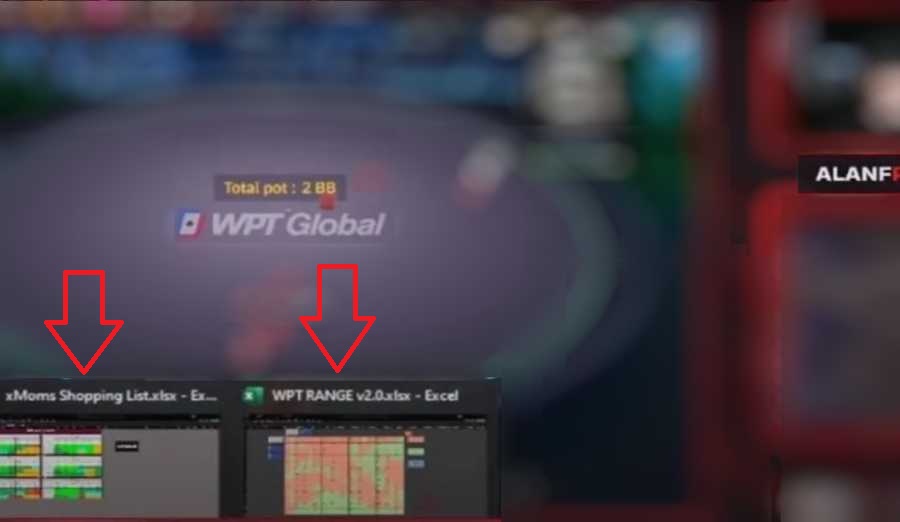RTA Crackdown: How Poker Sites Are Revolutionizing Detection and Enforcement

The online poker community has been buzzing with discussion following WPT Global's recent decision to ban Irish poker streamer Alan Finn after he was caught with preflop charts visible during his Twitch broadcast. The news has reignited the ongoing debate about what constitutes real-time assistance (RTA) and how poker sites should enforce their rules against external aids.
But the Alan Finn case represents more than just another ban—it signals a fundamental shift in how poker platforms approach detection, enforcement, and public communication around RTA violations. This incident provides valuable insights into the evolving landscape of poker integrity and technological detection methods.
The Alan Finn Incident: A Case Study in Modern Detection
Alan Finn, known as "AlanFPoker" on Twitch where he has approximately 2,700 followers, was streaming low-stakes holdem cash games on WPT Global when poker pro Patrick Leonard shared screenshots showing Excel spreadsheets visible on Finn's screen. The spreadsheets in question were labeled "WPT Range" and, rather humorously, "Moms Shopping List" – both containing basic preflop hand ranges.
WPT Global wasted no time in their response, announcing on their X (formerly Twitter) account: "We don't tolerate RTA. AlanFPoker has been banned with immediate effect." The site followed with another message urging players to "keep the game alive."
According to WPT Global's rulebook, specifically Rule 9.2, players are "prohibited from using devices such as robots or any other external player assistance (EPAs) program that distort normal play on the Site and give the player an unfair advantage." Their prohibited activity list explicitly mentions "referencing software, strategy charts or plots, range matrices, or any other aid that includes betting or strategy information."

What Made This Case Different
Unlike many RTA violations discovered through algorithmic detection, the Finn case unfolded entirely in public view. The violation was first identified and shared by a fellow participant, highlighting the role of community vigilance in maintaining game integrity. The screenshots provided indisputable visual evidence, eliminating the ambiguity that often surrounds RTA allegations.
The Technical Distinction: Understanding Different Types of Assistant
The ban has sparked considerable debate within the poker community. Some argue that basic Excel spreadsheets differ significantly from sophisticated solver software that performs complex calculations in real-time.
While the poker community debates severity, it's important to understand the technical distinctions between different types of assistant tools:
**Static Reference Materials** (Like Finn's spreadsheets):
- Pre-computed hand ranges
- Fixed decision trees
- Basic positional guidelines
**Dynamic Calculation Tools**:
- Live equity calculators
- Active solver recommendations
- Adaptive range adjustments
**Automated Assistance Software**:
- Screen-reading capabilities
- Automatic situation recognition
- Instant mathematical computation
This raises interesting questions about the boundaries between study materials and prohibited assistance. When Doug Polk and Daniel Negreanu negotiated terms for their high-stakes heads-up match in 2020, they actually agreed that preflop charts were acceptable to use during play.
The Evolution of Detection Technology
The Finn case, while resolved through community reporting, illustrates the broader challenge poker sites face in detecting various forms of assistance. Modern detection methods have evolved significantly beyond simple software monitoring.
Traditional vs. Advanced Detection
**Pattern Analysis**:
- Statistical deviation from expected play patterns
- Timing analysis of decision-making
- Bet sizing pattern recognition
**Advanced AI-Powered Detection**: Leading poker platforms are now implementing sophisticated AI systems that analyze multiple data points simultaneously, including mouse movement patterns, keystroke timing analysis, and GTO deviation analysis.
**Cross-Platform Intelligence**:
- Shared databases of known violations
- Real-time threat intelligence between sites
- Industry-wide pattern recognition
The poker industry faces an ongoing technological arms race between detection capabilities and evasion techniques. As detection methods become more sophisticated, so do the methods used to circumvent them.
The Arbitrary Line Between Study and Cheating
What makes the Finn case particularly interesting is how it highlights the arbitrary nature of what constitutes "prohibited assistance" across the poker industry. Basic preflop charts are considered beginner-level study materials by most poker educators. Many players have these ranges memorized after sufficient practice.
Yet the line between permitted study and prohibited assistance remains frustratingly vague. Is a player who has memorized optimal ranges fundamentally different from one who glances at a chart? The poker sites' policies rarely address these nuances.
Most concerning is how these rules create a system where the method of accessing poker knowledge, rather than the knowledge itself, becomes the determining factor in what's considered cheating. A person with a photographic memory who has studied charts extensively faces no penalties, while someone referencing the same information in spreadsheet form risks their account and funds.
Inconsistent Enforcement Across Platforms
Finn's case draws particular interest when compared to how ACR Poker handled a similar situation with former ambassador Jose "Nacho" Barbero. Earlier this year, Barbero posted an image showing GTO Wizard (a much more sophisticated solver tool) open in the background while playing on ACR.
Unlike WPT Global's immediate action against Finn, ACR initially defended Barbero. The site ultimately severed ties with him, but reportedly not because of the potential RTA use – rather, it was his subsequent comments during a livestream suggesting that ACR "wasn't trying" to stop cheating that led to his departure.
**WPT Global's Approach**:
- Zero-tolerance policy implementation
- Immediate public enforcement
- Clear communication of violations
**ACR Poker's Response**:
- Initial defense of affiliated players
- Delayed enforcement actions
- Inconsistent application based on relationships
This inconsistency in enforcement raises serious questions about how poker sites prioritize rule violations. Is the severity determined by the sophistication of the tool used, the profile of the player involved, or simply how publicly the violation is exposed?
The Public Nature of Enforcement
What's particularly notable about the Finn case is how publicly WPT Global handled the ban. While most sites quietly suspend accounts, WPT Global named the player directly in their announcement. This public approach to enforcement represents a shift in how some poker rooms are addressing integrity issues.
Patrick Leonard, who initially shared the screenshot that led to the ban, later deleted his post, writing that there was "no need to destroy him publicly" and hoping Finn would "learn from it."
The public nature of these incidents suggests that enforcement may be driven as much by public relations concerns as by consistent application of rules. When violations become visible to the community through social media, sites face pressure to take decisive action.
**Arguments for Public Enforcement**:
- Deterrent effect on potential violators
- Demonstrates platform commitment to fair play
- Educational value for the community
**Arguments for Private Enforcement**:
- Protects individuals from public shaming
- Allows for thorough review without premature publicity
- Enables education and correction without permanent reputation damage
Industry Response and Future Challenges
The challenges highlighted by cases like Alan Finn's have sparked significant innovation across the poker industry. Platforms are investing heavily in new technologies and collaborative approaches to maintain game integrity.
**Technological Innovation Trends**:
- AI-powered detection systems with live behavioral analysis
- Cross-platform data sharing and violation databases
- Enhanced monitoring capabilities including hardware fingerprinting
**Collaborative Industry Initiatives**:
- Training site partnerships for shared information about RTA tools
- Industry standards development and best practice sharing
- Community engagement through education programs
Economic Impact
The presence of RTA creates significant economic impacts that extend beyond individual losses:
**User Financial Impact**:
- Losses to RTA-assisted opponents
- Reduced confidence in game fairness
- Migration to alternative platforms
**Platform Effects**:
- Increased security investment costs
- Reputation management expenses
- Need for competitive advantage in fair play
Moving Forward: The Future of RTA Prevention
As poker continues to evolve in the digital age, sites face growing challenges in defining and enforcing rules against external assistance. The line between legitimate study tools and prohibited aids becomes increasingly blurred as more sophisticated technology becomes available.
**Emerging Challenges**:
- AI-powered assistance tools becoming more sophisticated
- Detection methods struggling to keep pace
- Varying jurisdictional approaches to regulation
**Key Principles for Future Development**:
- Consistency in enforcement across platforms
- Transparency in communication about policies and detection
- Education programs to prevent inadvertent violations
- Continued investment in detection technology
- Industry-wide cooperation to address RTA challenges effectively
Conclusion
The Alan Finn incident, while seemingly straightforward, reveals the complex challenges facing the modern poker industry. From the technical distinctions between different types of assistance to the philosophical questions about the nature of poker skill itself, this case illuminates the broader issues surrounding RTA in online poker.
One thing is clear: the debate around charts, solvers, and real-time assistance isn't going away anytime soon. As this incident demonstrates, even basic Excel spreadsheets can trigger significant consequences in today's increasingly vigilant online poker environment.
The poker industry's response to RTA challenges will shape the future of online poker for years to come. Platforms that successfully balance fair play enforcement with user education and privacy protection will likely emerge as leaders in the post-RTA landscape.
For users, the Alan Finn case serves as a reminder that compliance with platform policies is not optional, regardless of the sophistication of the tools involved. The distinction between study and assistance may seem arbitrary, but it represents a fundamental boundary that poker platforms are increasingly committed to enforcing.
As technology continues to evolve, so too must the approaches to maintaining competitive integrity in online poker. The lessons learned from cases like Alan Finn's will inform these developments, helping to create a more secure, fair, and sustainable environment for all poker players.